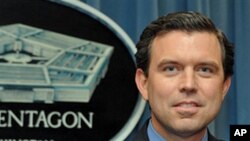The Pentagon Press Secretary says the U.S. government is working to figure out which mid-level Taliban officials it might be possible to integrate into the current Afghan political structure. The comment came as Afghan President Hamid Karzai is expected to unveil a "reintegration" plan for Taliban members at Thursday's London Conference.
Press Secretary Geoff Morrell says the United States supports the idea of reintegrating Taliban foot-soldiers, who senior U.S. officials including Defense Secretary Robert Gates have said are mainly interested in earning a living, or are intimidated into joining the insurgency. Morrell also says top Taliban figures, like the country's former leader Mullah Omar, would probably be what he called "a bridge too far."
"Omar is probably the extreme," said Geoff Morrell. "The foot-soldiers are probably the other extreme. The question is what happens to the others. Can they be won over? Can they become a part of the political fabric, as [Secretary] Gates spoke of? And that's, I think, what we're all trying to figure out. And I don't know that we have an answer yet."
U.S. officials say the answer to that question is largely an Afghan government issue, but Morrell said he expects officials in Kabul to make their decisions in consultation with U.S. President Barack Obama. Morrell indicated senior Taliban leaders like Mullah Omar who, in his words, "has the blood of thousands of Americans on his hands," would likely not be acceptable candidates for "reintegration."
On Tuesday, the United Nations announced it had removed five former Taliban officials, including a former foreign minister, from its list of terrorists, ending restrictions on their travel and bank accounts. That could be a first step toward involving them in a reconciliation process.
Speaking to reporters Wednesday, Geoff Morrell said most modern conflicts ultimately have a political solution - some form of reconciliation - including, for example, the Iraq war. He said the U.S. role in Afghanistan is to use its military might to help provide Taliban fighters and their supporters the motivation to participate in such a process.
"Our role in that is setting the conditions by which that can take place," he said. "Clearly, the conditions are tenuous right now for such a thing to take place because the perception is, at least, that the Taliban enjoys the momentum in this fight. So long as they are feeling emboldened by their successes, it is not likely that they are going to lay down their arms, recognize the democratically elected government in Kabul, pledge allegiance to it and support it."
Morrell says he hopes more Taliban fighters "reassess" their positions in the coming months, as tens of thousands more U.S. and international troops flow into the country.
U.S. officials also note that there is a civilian component to the effort, with governance and development experts working to help the Afghan government improve the lives of the Afghan people, so they reject the Taliban and make it more difficult for the group to operate.




